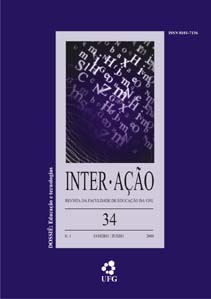EDUCATING FOR THE UNPREDICTABLE: TECHNOLOGIES IN A WORLD WITHOUT FRONTIERS
DOI:
https://doi.org/10.5216/ia.v34i1.6539Keywords:
Childhood education, Public policies. International organizations, Education and reducing povertyAbstract
In the 1990s, McLuhan had already foreseen the educational changes that are being experienced nowadays, marking the distance between the speed of information and school learning. This era was characterized by the implanting of digital technologies which went on to play an influential role in education and in the manner of understanding space and time. The information previously provided by the mass media multiplied feverishly with the introduction of the Internet, which, in turn, represented a change in the cultural and educational scenario. This study discusses the meaning of the cultural changes brought about by the new information and communication technologies and the impact of these digital technologies on educational processes.
Downloads
Downloads
Published
How to Cite
Issue
Section
License
Inter-Ação uses the Creative Commons Attribution 4.0 License for Open Access Journals (Open Archives Initiative - OAI) as the basis for the transfer of rights. Open access means making documents available on the Internet free of charge, so that users can read, download, copy, distribute, print, search, or link to the full text of documents, process them for indexing, use them as input data for software programs, or use them for any other lawful purpose, without financial, legal, or technical barriers.
Authors publishing in this journal agree to the following conditions:
1) Authors retain copyright and grant the journal the right of first publication, with the work simultaneously licensed under the Creative Commons Attribution License, which permits redistribution of the work with attribution and first publication in this journal.
2) Authors are permitted to enter into additional, separate agreements for non-exclusive distribution of the version of the work published in this journal (e.g., for publication in an institutional repository or as a book chapter), with attribution and first publication in this journal.
3) Authors are permitted and encouraged to publish and distribute their work online (e.g. in institutional repositories or on their home page) at any time before or during the editorial process, as this may generate productive changes as well as increase the impact and citation of the published work.















